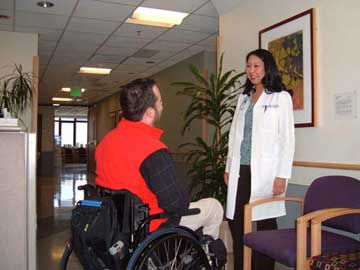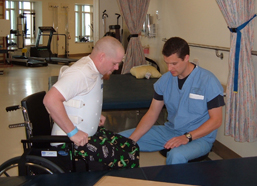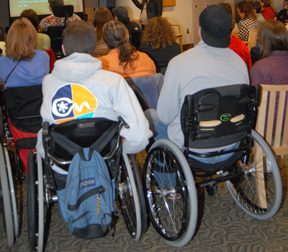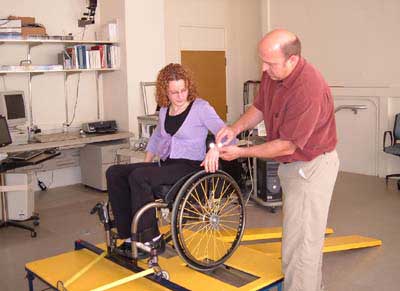Fall 2002: Volume 11, Number 2
Preventing UTIs Through Patient Education
Results of a Northwest Regional SCI System Study
Urinary tract infection (UTI) is a common medical problem throughout the lifetime of many individuals with SCI and has been reported as the leading cause of rehospitalization after SCI. Thus, prevention of UTI remains one of the primary goals of neurogenic bladder management in SCI.
In an era of reduced length of stay for inpatient rehabilitation, the patient with acute SCI may leave the rehabilitation center long before the bladder has recovered from "spinal shock" (i.e., has recovered any reflex activity) and before the best method of bladder management has been determined. Upon discharge, the patient may return to a primary care provider who may not be knowledgeable in SCI bladder management options or in the prevention of UTIs in this population. It is therefore important to educate the patient about the particulars of his or her own bladder management and the signs and symptoms of UTI.
In a study funded by NIDRR (National Institute on Disability and Rehabilitation Research), Diana D. Cardenas, MD, MHA, project director of the Northwest Regional SCI System, and colleagues Jeanne M. Hoffman, PhD, Eve Kelly RN, and Michael E. Mayo, MD, investigated whether a program that educated patients about UTI prevention could reduce the frequency and severity of UTIs. They also wanted to know what kind of impact an educational program would have on psychological factors such as subjects' health beliefs, locus of control (feelings of being able to control their own health), and self-efficacy (confidence that they would be able to carry out illness prevention behaviors).
The study involved 56 subjects with SCI and a history of UTIs who were randomized either to a control or treatment group. The 29 individuals in the treatment group received a UTI prevention education program consisting of written material on UTIs, a self-administered test, one training visit each with a nurse and physician, and a follow-up phone call. The 27 participants in the control group continued using their usual manner of bladder management throughout the study without any instruction from the investigators. Over a 10- to 12-month period, participants provided monthly urine samples (for urinalysis and culture and sensitivity testing) and information about their symptoms and episodes of UTIs.
The study looked at four outcomes: urine bacterial counts (urine colony counts); symptoms reported by participants; number of UTIs (defined as significant bacteriuria and at least one symptom); and episodes of antibiotic use.
At the end of the study period, the group that received the education program showed a significant reduction in the number of significant urine colony counts (P = .002) and antibiotic treatment episodes (P = .032) compared to the control group. The treatment group also tended to report fewer symptoms over time than the control group, although this relationship was not statistically significant. While there was not a significant reduction in the numbers of UTIs in the treatment group, there was a trend for those in the treatment group who were using intermittent catheterization (IC) to have fewer infections.
Although self-efficacy and locus of control have been found to relate to improved health outcomes in other chronic health conditions, this study did not find that higher internal locus of control was directly related to reduction in the frequency or severity of UTIs. There was a significant decrease in the perception of the severity of UTIs over time in the treatment group, suggesting that frequent contact with health care providers may increase a sense of security. There was no increase in the perception of the benefits of complying with UTI prevention tasks in the treatment group. In fact, the treatment group showed a decrease in self-efficacy. This is an area for further research.
In conclusion, the researchers found that the brief educational intervention resulted in decreased colony counts and antibiotic usage as well as a trend for decreased UTIs for those using IC.
Dr. Cardenas and her co-investigators wish to thank all those with SCI who participated in this study.






